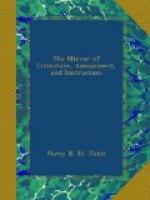RIENZI’S FALL.
And for such I left
The assured condition of my lowliness,—
The laughing days, the peaceful nights,
the joys
Of a small, quiet home—for
such I risked
Thy peace, my daughter. Abject, crouching
slaves!
False, fickle, treacherous, perjured slaves!
* * * * *
Oh, had I laid
All earthly passion, pride, and pomp,
and power,
And high ambition, and hot lust of rule,
Like sacrificial fruits, upon the altar
Of Liberty, divinest Liberty!
Then—but the dream that filled
my soul was vast
As his whose mad ambition thinned the
ranks
Of the Seraphim, and peopled hell.
These slaves!
These crawling reptiles! May the
curse of chains
Cling to them for ever.
LIBERTY.
For liberty! Go seek
Earth’s loftiest heights, and ocean’s
deepest caves;
Go where the sea-snake and the eagle dwell,
’Midst mighty elements,—where
nature is.
And man is not, and ye may see afar,
Impalpable as a rainbow on the clouds.
The glorious vision! Liberty!
I dream’d
Of such a goddess once—dream’d
that yon slaves
Were Romans, such as rul’d the world,
and I
Their tribune—vain and idle
dream! Take back
The symbol and the power.
We can well imagine the effect which Mr. Young gives to some of these eloquent passages. They are full of poetical and dramatic fire. Indeed, we know of no professor of the histrionic art who could give so accurate an embodiment of Rienzi—as Mr. Young, the most chaste and discreet, if not the most impassioned, actor on the British stage. Again, we can conceive the force of these lines in the manly tones of Mr. Cooper:
I know no father, save the valiant dead
Who lives behind a rampart of his slain
In warlike rest. I bend before no
king,
Save the dread Majesty of heaven, Thy
foe,
Thy mortal foe, Rienzi.
In reprinting Rienzi, we suggest a larger size; we fear people in a second row of either circle of boxes, will find the type of the present edition too small; besides, they do not want to be checking the performers, or to be puzzled with “stage directions.”
* * * * *
THE BOY’S OWN BOOK.
The sight of this little book, as thick as, and somewhat broader than, a Valpy’s Virgil, will make scores of little Lord Lingers think of “bygone mirth, that after no repenting draws.” It is all over a holiday book, stuck as full of wood-cuts as a cake is of currants, and not like the widely-thrown fruit of school plum puddings.
To begin with the exterior, which is one of the most ingenious specimens of block-printing we have yet seen. The medallion frontispiece contains the Publishers’ Dedication to “the young of Great Britain,” in return for which their healths should be drunk at the next breaking-up of every school in the empire.




